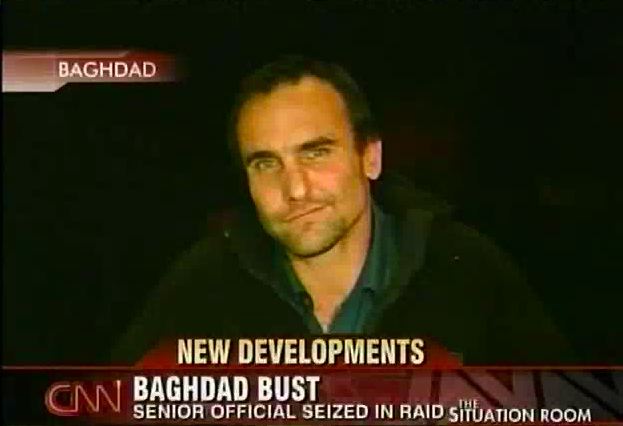TSR: "This caused an enormous flap in parliament."

Click photo to play
Length: 3:52
WOLF BLITZER: In Iraq, meanwhile, civilians were slaughtered today at a mosque and a market. Dozens were killed in the two bombings. Dozens more died at the hands of gunmen. And the U.S. military says 13 insurgents were killed in a coalition air strike targeting foreign fighters.
Allied forces also struck back in the heart of Baghdad where authorities now say a stunning raid nabbed a senior Iraqi government official accused of close ties to a radical militia. Joining us now from Baghdad, our correspondent Michael Ware.
Michael, there's obviously evidence that various Iraqi ministries, the police force, the army have been infiltrated and now this arrest of this deputy health minister. How big of a deal is this?
MICHAEL WARE, CNN CORRESPONDENT: This is a significant move, Wolf. I mean it's long been known by the U.S. military and the intelligence agencies that members of the government, senior members of these ministries, people in cabinet, have been involved in a whole range of nefarious activities from corruption to death squads.
Well, in terms of the politics here on the ground, this has been a daring maneuver. Iraqi Special Forces which, by and large, effectively answer only to the American military, storm into the Ministry of Health and take a deputy minister and drag him away. This caused an enormous flap in parliament. And this is a direct challenge to the political might of rebel anti-American cleric Muqtada al-Sadr. This is a big deal, Wolf.
BLITZER: Because supposedly this Deputy Health Minister is aligned with this anti-American radical Shiite cleric and his Mahdi Army. So what can Muqtada al-Sadr do about this?
WARE: Well, not a great deal. I mean, this is one of his politicians. This man is from essentially his political party. But there's not a lot that they will do immediately. I mean, they're not going to take to the streets. There's not going to be armed confrontations.
These guys are far too savvy to gamble that much so openly on just one individual. We're seeing a series of arrests of some of the key Mahdi Army people, both the military and political figures. This is just another one. They're really starting to try and put the squeeze on Muqtada.
And note, Wolf, that the U.S. military is by and large doing this on its own. It's driving this, I think because it's not getting the help it needs from the Iraqi government. Remember, the prime minister is in power because of Muqtada and his Mahdi Army.
BLITZER: Well, if you look down the road the next few weeks, months, who is going to win this battle? It's effectively, as you've painted, a battle between Muqtada al-Sadr and his Shiite army on the one hand and the U.S. on the other.
WARE: Well, at this stage you'd have to say that, you know, all the odds are in Muqtada's favor. I mean possession is nine-tenths of the law. I mean, he's the one who holds the momentum on the streets. It's his large block within parliament that was kingmaker that put Maliki into power, the Iraqi prime minister.
They still hold much sway. Sadr City, the true stronghold here in the capital of the Mahdi Army militia, home to almost half of the city's population of more than five million, has yet to be really confronted by the U.S. military. The military says we can access all parts of the city.
Yes, they can storm in and storm out, guns blazing. But the U.S. military cannot stay in Sadr City. So right now, Muqtada and his factions definitely have the upper hand.
BLITZER: Michael Ware, our reporter in Baghdad. Michael, thanks.
WARE: Thank you, Wolf.
